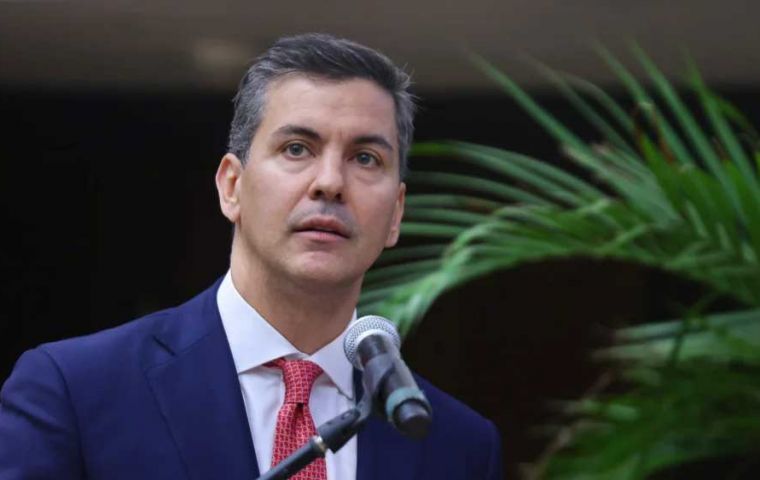MercoPress. South Atlantic News Agency
Operation Sweetness, check your sugar when having coffee or tea
 President Santiago Peña said ”Operation Sweetness,” added to a string of “very sad episodes” in Paraguay, transformed in a key drug trafficking hub in the region.
President Santiago Peña said ”Operation Sweetness,” added to a string of “very sad episodes” in Paraguay, transformed in a key drug trafficking hub in the region. The discovery of cocaine and other hard drugs shipments to Europe from South American Atlantic ports is not new and despite all efforts, the network of contacts coupled with ingenious methods to adapt to circumstances and obviously a notorious degree of corruption, keeps information flowing.
In this case authorities from land locked Paraguay in the heart of South America announced this week what is considered the largest seizure of cocaine in the country's history. In effect a shipment of more than four tons of cocaine was discovered hidden inside a shipment of sugar and bound for Antwerp in Belgium.
President Santiago Peña told journalists that the record discovery, code-named “Operation Sweetness,” added to a string of “very sad episodes” in Paraguay that had transformed the strategically located nation into a key drug trafficking hub in the region.
Peña expressed hope that the seizure, valued at roughly at US$ 240 million, would disrupt the cocaine trade and said police were pursuing those responsible.
“I think it sends a signal to organized gangs not to use Paraguay as transit; they’re going to find authorities that are determined and working in a coordinated way,” Peña said, promising further efforts to boost port security. “Gangs are not going to be able to avoid all the controls that we are implementing.”
Last Monday, July 15, agents from Paraguay’s anti-drug agency, known as Senad, started unpacking the shipping containers filled with 40-kilogram sacks of sugar at Puerto Caacupemi, a river port in the capital, Asunción. On Tuesday they had collected more than four tons and were still sorting and weighing the cocaine concealed inside the cargo.
It wasn’t immediately clear where the drugs originated. Unlike nearby Bolivia, Colombia and Peru, Paraguay does not produce cocaine. But in recent years the small landlocked nation has grabbed headlines as a smuggling haven — for cigarettes and luxury goods in addition to drugs — as cartel bosses devise new routes to reach new markets. That has spawned corruption and even violence in a country previously unaccustomed to drug violence.
Some of the biggest cocaine busts in Europe, especially in Antwerp’s port in Belgium, have been traced back to Paraguay’s bustling river ports where dodgy deliveries can slip under the radar.
“Geographically, Paraguay has a strategic position for organized crime in the sense that we are located near the largest cocaine producers in the world,” Francisco Ayala, the spokesperson of Senad, said from the port where authorities inspected the haul of cocaine. “It has a globally recognized river traffic system … it’s perfect.”
But for Mercosur countries despite president Peña's hopeful statements the task and challenge can be overwhelming. In Brazil two rival gangs, dominate the jails system, are better armed and prepared than police forces, and they are involved in financing politics. In Argentina with president Milei and his tough Security minister, Patricia Bullrich, the situation is beginning to improve from the rather relaxed and supportive previous K governments, while in Uruguay a far smaller territory, new radars to check on rogue aircraft landing on improvised air fields, and state of the art scanners to check loading containers in the port of Montevideo should help with stricter controls. Previous scanners allegedly were sabotaged purposely, but hard to prove.




Top Comments
Disclaimer & comment rulesCommenting for this story is now closed.
If you have a Facebook account, become a fan and comment on our Facebook Page!